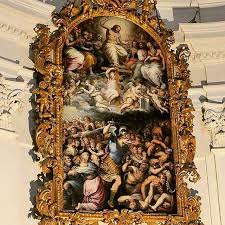The theocentrism (Greek theos “God” and kentron “center”, which literally means “God as the center of the world”) is grounded doctrine the precepts of the Bible, where God is the foundation of everything and in charge of all things.
This thought prevailed during the Middle Ages , and is opposed to later doctrine, anthropocentrism as well as Renaissance humanism , whose focus is on man as the center of the world. Thus, theocentrism was mainly focused on valuing sacred thought so that pleasure was seen as a sin. Thus, divine desire overrides human will and rationality.
No wonder, the theocentrism Medieval represented the relationship between the divine (religion) and the citizens of the Middle Ages, ie the existence of a single truth, inspired by Christ and the precepts of the Bible. It was in this way, refuting scientific and empiricist ideas, that religion and consequently God, remained for centuries as the central and saving figure, present in the mentality of the population, as well as in the social, political, cultural and economic aspects of the time.
It is noteworthy that during the Middle Ages (5th to 15th centuries), the Church held great power alongside the Nobility, who believed in a single truth and controlled the lives of the population, whether culturally or politically. Therefore, individuals who criticized or questioned the Church’s dogmas, were treated as “children of the devil”, deserving of punishment or even death.
Faced with this theocentric mentality that prevailed for centuries in Europe, the Church and religion held great power and thus were central to the life of the people. However, many scientific researches developed at the time, became fundamental for the change of the European mentality, of which the best known is Copernicus’ Heliocentrism (1473-1543).
The mathematical model of the Polish astronomer and Copernicus, presented in 1514, developed a new theory whose Earth revolved around the sun, which in turn would be at the center of the solar system, while refuting the geocentric model defended by the Church, leading thus to many concerns of being.
In addition to heliocentrism, the crisis of the Middle Ages and the Church was already emerging and with it a new mentality and anxiety of the European population was approaching. One of the great examples of uncertainties and at the same time of human ambition, was the period of the great navigations , whose Iberian countries were the precursors of the conquests accomplished abroad, developing the commerce, as well as the emergence of the bourgeoisie.
Note that along with this, the Protestant Reformation (1517) of Martin Luther, refuted and questioned several actions developed by the Church such as the sale of indulgences and ecclesiastical authority. Thus, the population gradually became aware and opened up more to issues related to being, which led to the strengthening of the cultural renaissance (14th to 16th centuries), and consequently to Italian humanism (15th and 16th centuries), leaving aside the theocentric worldview.
For humanists, this unilateral view developed in the Middle Ages and highlighted by theocentrism, was related to a great period of artistic, intellectual and philosophical setbacks, which they called “Dark Ages”, in reference to the obscurantism of the medieval.

